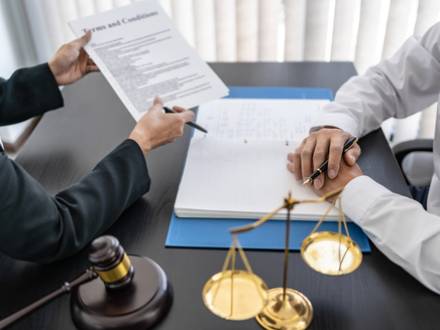Recent Blog Posts
What If My Spouse Does Not Want a Divorce?
 Few things are more frustrating than being ready to move on from a broken marriage, only to have your spouse refuse to let go. Whether he or she is in denial, trying to control the situation, or simply unwilling to cooperate, his or her refusal can make an already painful process even more stressful. The good news is that in Illinois, the law supports your right to seek a divorce, even if your spouse objects. A DuPage County divorce lawyer can help you take the proper steps and protect your interests every step of the way.
Few things are more frustrating than being ready to move on from a broken marriage, only to have your spouse refuse to let go. Whether he or she is in denial, trying to control the situation, or simply unwilling to cooperate, his or her refusal can make an already painful process even more stressful. The good news is that in Illinois, the law supports your right to seek a divorce, even if your spouse objects. A DuPage County divorce lawyer can help you take the proper steps and protect your interests every step of the way.
Can I Still File for Divorce If My Spouse Refuses?
Illinois follows a no-fault divorce system, which means you are not required to demonstrate that your spouse did something wrong, like being abusive or cheating. Instead, you only need to show that the marriage has broken down due to irreconcilable differences.
What Are the Benefits of Mediation in an Illinois Divorce?
 Tension across the dinner table. Silent car rides. Arguments over parenting, money, and what comes next. A divorce can leave both spouses feeling frustrated, exhausted, and unsure where to turn. But in Illinois, there is an alternative to airing grievances in open court: mediation.
Tension across the dinner table. Silent car rides. Arguments over parenting, money, and what comes next. A divorce can leave both spouses feeling frustrated, exhausted, and unsure where to turn. But in Illinois, there is an alternative to airing grievances in open court: mediation.
This structured, private process empowers spouses to negotiate fair solutions without the hostility of a courtroom battle. Paired with the support of a knowledgeable Will County divorce attorney, mediation can help make a high-conflict separation into a constructive step toward closure and stability.
How Does Mediation Work in an Illinois Divorce?
Mediation involves a neutral third party, called a mediator, who helps spouses discuss and negotiate the terms of their divorce. The mediator does not make decisions, but instead facilitates productive communication so the spouses can reach a mutually acceptable agreement.
What Can I Do If My Ex Stops Paying Child Support?
 When a parent refuses to pay court-ordered child support, the consequences can cause immense stress. The custodial parent may suddenly be left to cover all of the child’s expenses, from groceries and school supplies to medical bills and housing. Worse yet, the child may face disruptions to his or her routine, education, or overall stability.
When a parent refuses to pay court-ordered child support, the consequences can cause immense stress. The custodial parent may suddenly be left to cover all of the child’s expenses, from groceries and school supplies to medical bills and housing. Worse yet, the child may face disruptions to his or her routine, education, or overall stability.
If your ex has stopped making child support payments, it is important to understand your legal options. A Will County, IL family law attorney can guide you through the proper steps to ensure your child receives the support he or she is legally entitled to receive.
What Should I Do First If Child Support Payments Stop?
If you notice that payments have stopped, the first step is to confirm the details of your child support order and start keeping detailed records. Make sure you note:
Will a Divorce Ruin My Retirement Plans?
 Divorce is not just an emotional transition, but a financial turning point that can reshape your future. For many people, one of the biggest concerns is whether years of retirement savings will vanish in the process.
Divorce is not just an emotional transition, but a financial turning point that can reshape your future. For many people, one of the biggest concerns is whether years of retirement savings will vanish in the process.
If you have spent decades planning for your golden years, the thought of dividing those hard-earned assets can be deeply upsetting. Whether you are approaching retirement or already living on a fixed income, a DuPage County, IL divorce lawyer can help you understand how Illinois law handles retirement accounts during divorce.
What Happens to Retirement Accounts in a Divorce?
In Illinois, retirement accounts are typically considered marital property if contributions were made to them during the marriage. Under the Illinois Marriage and Dissolution of Marriage Act, marital property is divided equitably and fairly, not necessarily equally.
What Documents Are Required to Start a Divorce in Illinois?
 Starting a divorce can feel like stepping into unfamiliar territory. Whether the decision was mutual or one-sided, most people quickly realize that ending a marriage involves more than emotions; it involves paperwork.
Starting a divorce can feel like stepping into unfamiliar territory. Whether the decision was mutual or one-sided, most people quickly realize that ending a marriage involves more than emotions; it involves paperwork.
When you decide to file, the court expects specific forms that start the legal process. Knowing what is required ahead of time can reduce stress and help you avoid expensive delays. A Will County, IL divorce lawyer can help you ensure everything is filed correctly and completely in a timely manner.
What Is the First Document You Need to File?
To begin a divorce in Illinois, you must file a Petition for Dissolution of Marriage with the circuit court in the county where either spouse resides. This petition initiates the legal process and outlines basic information about the marriage. It includes details such as both spouses’ names and addresses, the date and place of the marriage, and a statement that irreconcilable differences have caused the relationship to break down. Since Illinois is a no-fault divorce state, you are not required to prove misconduct.
Dividing Your Assets in a Divorce After Retirement
 If you are retired or nearing retirement when you get divorced, dividing your assets can be more complicated than it would likely be earlier in life. Getting your fair share of marital assets is also of utmost importance.
If you are retired or nearing retirement when you get divorced, dividing your assets can be more complicated than it would likely be earlier in life. Getting your fair share of marital assets is also of utmost importance.
In Will County, couples who spent decades building a life together often face the difficult task of separating shared retirement income, pensions, and property at a time when they cannot simply "earn it back." The stakes are high, and careful legal planning is critical.
As of 2025, Illinois divorce law still follows the principle of equitable distribution, meaning the court will divide marital assets fairly, though not necessarily equally. For people who have already stopped working, that process can feel particularly risky. This blog provides a brief overview of how marital assets are divided in divorce by our Naperville divorce lawyers. To read more about what is considered personal property rather than marital property, click here.
What Is the Discovery Phase of an Illinois Divorce?
 The discovery phase of the divorce process entails the exchange of important information. Most of the information is financial and related to the property division element of divorce. Illinois law requires both spouses to fully disclose financial information during divorce proceedings to ensure the fair and equitable distribution of assets and debts. Consider some basic elements of the discovery process, and talk to a knowledgeable Will County, IL divorce attorney about how it applies to your case.
The discovery phase of the divorce process entails the exchange of important information. Most of the information is financial and related to the property division element of divorce. Illinois law requires both spouses to fully disclose financial information during divorce proceedings to ensure the fair and equitable distribution of assets and debts. Consider some basic elements of the discovery process, and talk to a knowledgeable Will County, IL divorce attorney about how it applies to your case.
Is Discovery a Court-Ordered Process in Illinois?
If your divorce is contested, meaning that you and your spouse cannot agree on the main elements of divorce, the court will order discovery. The main elements of divorce include the division of property, the distribution of debt, spousal maintenance, and the allocation of parental responsibilities. In an uncontested divorce where you both agree on the terms, discovery can be voluntary, but this only happens when you can trust each other not to hide assets or intentionally withhold relevant information. Court-ordered discovery is much more formal.
How Do Collaborative and Traditional Divorces Differ in Illinois?
 In Illinois, there is more than one way to divorce, and some options are better suited for couples depending on their situation. Collaborative divorce, as the name implies, takes much of the fight out of the divorce process. Consider some key differences between collaborative and traditional divorces. If you have questions about which option could be right for you, a Will County, IL divorce attorney can help you by assessing your situation and the legal options that would best serve you and your spouse.
In Illinois, there is more than one way to divorce, and some options are better suited for couples depending on their situation. Collaborative divorce, as the name implies, takes much of the fight out of the divorce process. Consider some key differences between collaborative and traditional divorces. If you have questions about which option could be right for you, a Will County, IL divorce attorney can help you by assessing your situation and the legal options that would best serve you and your spouse.
What Is a Collaborative Divorce?
When you think of divorce, the litigation process is likely what comes to mind. Fighting it out in a courtroom is not the only option. With collaborative divorce, you typically settle all elements, including property division, spousal support, and the allocation of parental responsibilities, through mediation and negotiation. You would both have to willingly participate in the divorce process, and the attorneys representing each of you will work together to help you resolve the key components and come to a divorce agreement.
Understanding Litigation in an Illinois Divorce
 Many people are unaware that there is more than one way to go about getting a divorce in Illinois. Sometimes, you can resolve disputes and reach an agreement without ever entering a courtroom. However, more often than not, divorce litigation is necessary, and this can be a complicated process. If you are facing a contested or complex divorce, learning more about the litigation process is important, and a Will County, IL divorce litigation attorney can help.
Many people are unaware that there is more than one way to go about getting a divorce in Illinois. Sometimes, you can resolve disputes and reach an agreement without ever entering a courtroom. However, more often than not, divorce litigation is necessary, and this can be a complicated process. If you are facing a contested or complex divorce, learning more about the litigation process is important, and a Will County, IL divorce litigation attorney can help.
What Are the Types of Divorce Litigation in Illinois?
The broad definition of divorce litigation is that it is a process used to resolve disputes between the divorcing parties and is governed by state statutes. These laws cover every aspect of the divorce process, from the allocation of parental responsibilities to the division of property. In general, there are three main types of divorce litigation:
I’m Worried About the Impact of Divorce on My Kids. What Can I Do?
 For many parents, the hardest part of divorce is worrying about how it will affect their children. Kids may not understand why their family structure is changing, and they often experience a wide range of emotions, from sadness and confusion to fear and anger. Fortunately, there are many concrete steps parents can take to reduce the emotional impact of divorce and help their children adjust in healthy ways.
For many parents, the hardest part of divorce is worrying about how it will affect their children. Kids may not understand why their family structure is changing, and they often experience a wide range of emotions, from sadness and confusion to fear and anger. Fortunately, there are many concrete steps parents can take to reduce the emotional impact of divorce and help their children adjust in healthy ways.
At the Law Office of Ronald L. Hendrix, P.C., our Will County, IL divorce and child custody lawyer understands these concerns and works with parents to proactively protect kids during divorce. Call our firm today to learn more.
Four Strategies for Protecting Your Kids During Divorce
Every family is different, as is every child. That being said, children more or less have the same developmental needs: Stability, love, boundaries, and support. Here are some ways to provide those to your children during divorce.

















